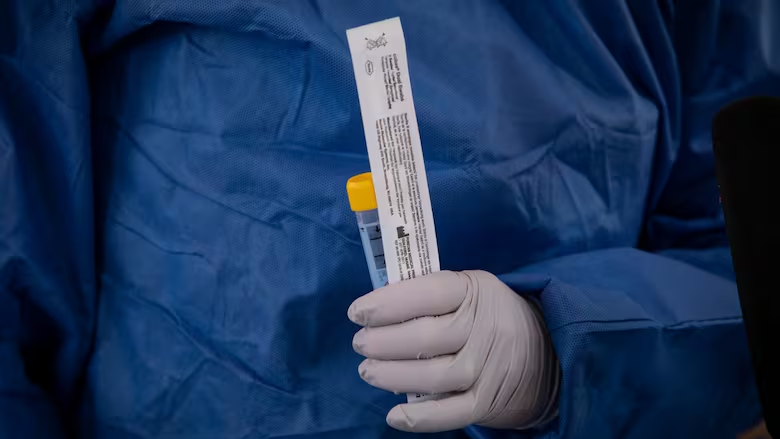What you need to know about COVID-19 in Alberta on Monday, June 22
At least 5 Edmonton restaurants temporarily close due to concerns over COVID-19

The latest:
- At least five Edmonton restaurants have voluntarily closed their doors after staff or customers recently tested positive for COVID-19.
- The number of active COVID-19 cases in Edmonton surpassed those in Calgary for the first time on Sunday, but Calgary once again took the lead for case numbers on Monday.
- As of Monday there were 245 active cases in Calgary and 236 in Edmonton.
- A total of 4,851 people have recovered from COVID-19 in the Calgary area, and 607 have recovered in the Edmonton area.
- The province reported 32 new COVID-19 cases on Monday, for a total of 542 active cases.
- A woman in her 90s who was a resident at Extendicare Hillcrest has died, bringing the total deaths in the province to 153.
- Some schools are seeing a rise in academic dishonesty since the COVID-19 pandemic forced students out of the classroom.
- Two funerals in the province have led to 24 new cases with many more close contacts potentially exposed.
- Twelve cases of COVID-19 have now been identified in an apartment building, likely through common high-touch surfaces.
What you need to know today in Alberta:
Alberta RCMP issued seven tickets to Americans who stopped in Banff National Park to see the sights last week in violation of the rules about cross-border travel.
Event restrictions have loosened, but people who run venues in Edmonton say they still face hurdles to fully reopening.
While it's still too soon for most universities to track if academic dishonesty has increased since the COVID-19 pandemic forced students out of classrooms, some early trends are pointing in that direction.
MacEwan University tracked the rates of academic dishonesty from March 15 to the end of the semester, showing a 38 per cent increase in academic dishonesty compared with the previous school year.
Alberta reported 32 new cases on Monday and one new death.

As of Monday, there were 542 active cases in the province. More than 396,000 tests had been completed.
The regional breakdown of cases on Monday afternoon was:
- Calgary zone: 245 active, 4,851 recovered.
- Edmonton zone: 236 active, 607 recovered.
- Central zone: 3 active, 85 recovered.
- South zone: 21 active, 1,257 recovered.
- North zone: 34 active, 229 recovered.
- Unknown: 3 active, 12 recovered.
There are 32 people in hospital, six of them in intensive care.

What you need to know today in Canada:
Data on work refusals reported to provincial labour authorities shows there's been a spike in the number of people who have formally refused to work citing dangerous conditions.
B.C.'s COVID-19 death rate of approximately 33 deaths per million people is one of the lowest among jurisdictions in Canada, the United States and western Europe with populations of five million or more. It came down to luck and good timing, experts say.
Fourth-year medical students across Canada are reporting stress and "agony" as the major standardized test that marks their transition from med school to residency has faced technical and communication problems.
Mexico says it will resume sending temporary farm workers to Canada after the two countries reached an agreement on improved safety protections for labourers on Canadian farms during the coronavirus pandemic.
As of 7 a.m. ET on Monday, Canada had 101,337 confirmed and presumptive coronavirus cases, with the majority in Quebec and Ontario. Of the total cases, 63,886 were listed as resolved or recovered. A CBC News tally of deaths based on provincial information, regional health data and CBC's reporting stood at 8,471.

The coronavirus has sickened more than 8.6 million people worldwide and killed at least 460,256, according to data compiled by Johns Hopkins University.
Self-assessment and supports:
Alberta Health Services has an online self-assessment tool that you can use to determine if you have symptoms of COVID-19, but testing is open to anyone, even without symptoms.
The province says Albertans who have returned to Canada from other countries must self-isolate. Unless your situation is critical and requires a call to 911, Albertans are advised to call Health Link at 811 before visiting a physician, hospital or other health-care facility.
If you have symptoms, even mild, you are to self-isolate for 10 days from the onset of symptoms.
You can find Alberta Health Services' latest coronavirus updates here.
The province also operates a confidential mental health support line at 1-877-303-2642 and addiction help line at 1-866-332-2322, available from 7 a.m. to 11 p.m., seven days a week.
Online resources are available for advice on handling stressful situations and ways to talk with children.
There is a 24-hour family violence information line at 310-1818 to get anonymous help in more than 170 languages, and Alberta's One Line for Sexual Violence is available at 1-866-403-8000, from 9 a.m. to 9 p.m.